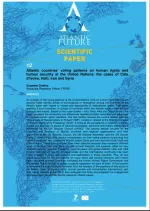Atlantic countries’ voting patterns on human rights and human security at the United Nations: the cases of Côte d’Ivoire, Haiti, Iran and Syria

Scientific paper, nº. 12
An analysis of the voting patterns at the United Nations (UN) on human rights and human security helps identify points of convergence or divergence among the countries of the
Atlantic basin with regard to values and approaches to international crises. This paper explores if such countries, or groups of countries within the Atlantic basin, share political
concepts and values. Based on four case studies – Iran, Syria, Haiti and Côte d’Ivoire – the paper assesses the similarities and differences regarding conflict resolution and responses
to massive human rights violations. The first section reviews the current debate over the UN principle of “Responsibility to Protect” (R2P), notably in relation to the Brazilian concept
of “Responsibility while Protecting” (RwP). It looks at the perceptions of Atlantic countries, groups and alliances on issues of national sovereignty, sanctions and military interventions
authorized by the UN Security Council (UNSC). The second section focuses on the initiatives and positions of Atlantic countries and regional organizations and their alignments at the UN Security Council, the UN General Assembly, and the UN Human Rights Council (HRC). The section concentrates on their voting patterns concerning four cases in particular: two outside the Atlantic space (Syria and Iran) and two inside (Haiti and Côte d’Ivoire). These four countries have been selected because they represent different types of conflicts: Iran and Syria are international hotspots and suppose, albeit for very different reasons, potential threats for regional peace and global stability; Haiti and Côte d’Ivoire rank high on the list of fragile states and the international community has been highly engaged in crisis management and stabilization in these countries. Plus, all four cases have been on the UN agenda for many years and serious concerns with human rights violations in these countries motivated the former Human Rights Commission and the Human Rights Council to assign a special rapporteur for each of them. A final section summarizes the main conclusions drawn from the analysis of the positions of key actors in the Atlantic basin on human rights, human security and humanitarian interventions, and their voting patterns at the UN. It then evaluates the limits and prospects for engagement and cooperation across the Atlantic based on shared values.